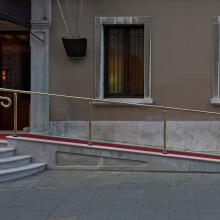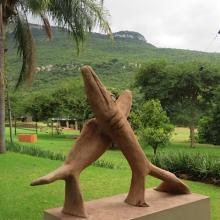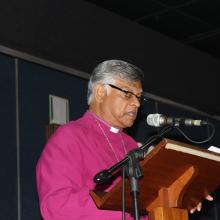Diversity
WASHINGTON — As the nine Supreme Court justices took up the vexing question of a constitutional right to same-sex marriage on Tuesday, the case came down to two competing visions of marriage: what it’s been, what it should be, and who gets to decide.
Outside the court, hundreds of demonstrators echoed both sides: Amateur evangelists and anti-gay zealots with signs proclaiming, “Man & Woman: United for Life, Open to Life,” and throngs of gay rights supporters chanting “Love Must Win!” to drown out the sidewalk preachers with their megaphones.
Yet ultimately, beyond both the arcane and real-life arguments over the state’s sanction of private relationships, the court must decide the very nature and purpose of marriage — or at least which nature will be reflected in civil law.
For being a television show based on absurdist humor and millennial first-world-problems, New Girl hit home earlier this month.
Winston, played by Lamorne Morris, is a roommate with a thousand changes in career, the latest and most lasting being that of a cop for the Los Angeles Police Department. The hilarity surrounding Winston has mostly been about his police training or his friend’s concern for his safety, when they tried to physically keep him from policing by stealing his cruiser keys. Then, with script writing help from Morris himself, New Girl took a momentarily serious turn.
When a pretty woman invites Winston on a date to the park for a rally to protest the police, who she describes arrested a 14-year-old because he “fit a description,” Winston declines, walking backward to hide his LAPD shirt.
He later says, “With everything that’s been going on, I just feel like she wouldn’t respect me.”
In that moment, Morris’ character finds himself caught between two conflicting worlds, what W.E.B. Du Bois called having a “double consciousness” — the brotherhood of a police force alongside white officers, keeping the peace and making neighborhoods safer; and the collective turmoil that comes with being a black man in a post-Ferguson America.
Many Americans must feel this conflicting pull and feel unable to voice it: citizens with friends or family who are officers and who are in solidarity with their black and brown neighbors; officers themselves who fear for their safety every moment they are on duty and battle with racial implicit bias because of harrowing experiences in their communities.
I myself feel this pull as a woman of color who grew up in North Philadelphia, where a mistrust of police was built into my framework of survival despite never once having a negative experience with Philly police. Solidarity with Eric Garner, John Crawford, and Dante Parker is a given. They are the kind of men I saw everyday growing up, men with questionable pasts and an unquestionable love for their families and communities — despite only the former being brought to light.
And I have met police officers working in neighborhoods where they and their partners are cornered and ambushed by street gangs; men and women with families, who are told they are hated by the black and brown children they rescue from crime scenes.
I turned to music as I wrote myself in circles, trying here to verbalize an emotion, a worried feeling that I’m not doing something right. I came across a radio interview with Community star and rapper Donald Glover in which he talks about what I believe Morris was battling with his New Girl script.
“Being young and black in America is schizophrenic. You kind of have to change who you are a little bit all the time for people to even respect you.”
Caryn Riswold wrote a moving article about Bruce Jenner’s interview on Friday with Dianne Sawyer. In the interview, Bruce states, “For all intents and purposes, I’m a woman. People look at me differently. They see you as this macho male, but my heart and my soul and everything I do in life – it is part of me. That female side of me. That’s who I am.”
Caryn’s article is titled “How Should People of Faith Respond to Bruce Jenner?” It is a compassionate response to Jenner and all people who identify as transgender. She states that all people are created in the image of God and so deserve our love and compassion. Sadly, many religious people disagree with Caryn, insisting that Jenner is confused, crazy, or just out for attention.
Caryn worries that Jenner will be mocked and ridiculed. She states that people of faith should not respond with ridicule, but rather with acceptance and compassion.
Pay attention to the one who isn’t laughing. The one who looks upset. The one who is desperately trying to escape the gaze and the mockery.
Pay attention to the ones on the margins. Whose image are they created in?
Not many people traveling in southern Africa consider Venda in the northern Limpopo Province a worthy touristic or project partnership visit. For years visitors to the South African Development Community have seen this more isolated, beautiful mountainous area of northern South Africa as a shortcut to Kruger National Park or to/from Pretoria and Johannesburg en route to the wonders of the 1,000-year-old Great Zimbabwe ruin or majestic Victoria Falls.
Perhaps a quick stop was worthy on the Musina-Beitbridge border to photograph the “great, green, greasy Limpopo River” made famous by Rudyard Kipling’s “How The Elephant Got His Trunk.” Not much else would interrupt the dash on the N1, similar to America’s own Route 1 from Canada to Florida.
Big mistake! As I found out when saying ill-advisedly to our travelling companions that “there really is nothing to see or stop for in the area … and we do have an important dinner appointment in Pretoria.” The twofold result was a serious late night ”domestic” with my more adventurous and intuitive wife, Karen, and secondly, a necessary, more open-minded review of the unexplored albeit minimalist pages on the Venda Region section of the Rough Guide and Lonely Planet guidebooks. Alas the travel guides seemed to have the same misperception as my 30-year-old wisdom.
“Come to the living God … Come to stand alongside those who suffer
Come to those who seek freedom … Come to resist all that offends God’s justice
Come to Jesus as He hangs on the Cross … Come to the living disturbing God.”
DURBAN, South Africa — A precursor to Easter sunrise and call to commitment is the now 30-year ritual Good Friday packing of the International Exhibition Center with 3,000+ ecumenical congregants participating (with dance, choir, prayers, and prophetic preaching) in the call to “Arise – Act for a Just Society.” Anglican Bishop Rubin Phillip set the scene with a moving historical reminder of the reason for the 1985 first march to the central prison. It was to protest the silencing of the 16 Durban “treason trialists” (including congregational deacon Archie Gumede, and Frank Chikane, post-apartheid member of the first multiracial Assembly, Apostolic pastor, and future President Nelson Mandela staff chief). Family members of the incarcerated and current elected leaders carried a cross to city hall, calling all to love mercy and act justly. We paused to give thanks for their courage at the one remaining wall of the prison now in the front plaza of the iconic convention center. When the first march 30 years ago stopped to sing and pray, “voices were heard from inside the prison joining in the singing of Good Friday hymns.”
While reflecting upon and celebrating Easter, I did quite a bit of thinking about the controversies surrounding so-called “religious freedom” bills that have been popping up recently, most notably Indiana and Arkansas. In a recent interview on the Family Research Council radio program, “ Washington Watch with Tony Perkins," former Arkansas Governor Mike Huckabee discussed the backlash against these two pieces of legislation.
Huckabee asserted that gay-rights activists are seeking the eradication of Christian churches. According to Huckabee, “It won’t stop until there are no more churches, until there are no more people who are spreading the Gospel.”
Christianity has been and continues to be the dominant form of religious practice and expression in America. Often the rhetoric used by members of dominant groups insinuates that when people outside of their dominant group ask for equal rights and the opportunity to participate fully in American life, they are actually seeking to eradicate the existence of that dominant group.
Editor's Note: Since original publication of this piece, Indiana lawmakers have announced changes to the Indiana RFRA legislation that includes anti-discrimination language.
Last week Indiana found itself at the center of the news cycle for all the wrong reasons. With Gov. Pence’s signing of the state's Religious Freedom Restoration Act, our nation once again found itself taking sides in the debate over LGBTQ rights.
Honestly, I’m torn over this issue. I understand that the Indiana bill was fashioned after the 1993 bill that was signed into federal law by Bill Clinton. I know that 19 other states have RFRA legislation. And, as a pastor, I support religious freedom, not just for Christians, but for Buddhists, Muslims, Jews, and yes, even Westboro Baptists. I think most Americans support protecting individuals' rights to conscientiously practice their faith. Freedom of religion is one of the things that makes this country great, and that freedom is worth protecting. But this bill, supposedly enacted to protect those freedoms, has caused quite the stir. Even more interesting to me are the people I follow on social media who are much more interested and knowledgeable than me in politics who say Indiana’s RFRA won’t amount to significant change. This raises the very simple question, “Then why pass the bill?”
SHE WAS MAD—fuming.
Thirteen black evangelical leaders rolled across Southern states on a speaking tour of historic black colleges and universities. On a mission to call forth the next generation of black leaders, we traversed the land where our ancestors had worked fingers to bone, drank from separate fountains, and cut loved ones down from trees like dead fruit.
But this is not what made Vera mad.
For the last hour a crowd of black leaders sat, stood, and leaned in as we shared our stories of barriers to advancement within white evangelical organizations. It wasn’t a mean-spirited conversation. It was a needed one—a healing one. Our stories were strikingly similar, even though none of us had worked in the same organization.
WHEN FATHER THOMAS PHILIPPE brought philosopher Jean Vanier on a tour of asylums, institutions, and psychiatric hospitals, Vanier discovered “a whole new world of marginalized people ... hidden away far from the rest of society, so that nobody could be reminded of their existence.” A year after this realization, recounted in The Heart of L’Arche, Vanier founded the first L’Arche community in his new home in France. Vanier shared meals, celebrations, and grievances with Raphael Simi and Philippe Seux, two men who had lived in asylums ever since their parents passed away.
Vanier was inspired by life with these friends, and motivated by a new understanding of Luke 14:12-14: “‘When you give a luncheon or a dinner, do not invite your friends or your brothers or your relatives or rich neighbors, in case they may invite you in return, and you would be repaid. But when you give a banquet, invite the poor, the crippled, the lame, and the blind. And you will be blessed, because they cannot repay you, for you will be repaid at the resurrection of the righteous.’”
In the words of Vanier, “L’Arche is a school of love.” It is a “family created and sustained by God,” and it is an embodiment of the belief that “each person is unique, precious, and sacred.” In practice, L’Arche is a global network of communities: People living with and without developmental disabilities sharing meals, prayers, work, and advocacy efforts.

Baloncini / Shutterstock
RECENTLY, THE CATHOLIC CHURCH moved toward beatifying Archbishop Óscar Romero, who was martyred while presiding at a Mass in El Salvador in 1980. Romero preached that, for the love of God, soldiers and paramilitary forces must stop murdering their brothers and sisters—and he paid with his life. Many have since honored his witness during El Salvador’s civil war as “a voice for the voiceless.” Without a doubt, more of us should take on that mantle.
And yet. Sometimes we are notcalled to be a voice for the voiceless. Sometimes we are called to listen carefully and discover the voices in our midst. Sometimes we are called to consider whether weare the ones preventing voices from being heard.
We are almost 25 years beyond the passage of the Americans with Disabilities Act, and while access is still not all it should be, we need to move beyond the wheelchair ramp. We need to listen to those living with disabilities—as fully human, as fallen and holy, as friends of Christ, as people with abilities, as disciples on the Way.
What is disability? This simple question is not easily answered. There are people living with impairments, a loss of expected physiological form or function. A person missing a leg. A person whose optic nerve did not develop correctly. A person who has sustained a brain injury. The disability refers to the consequences of an impairment: loss of walking, blindness, memory issues. Handicap, in turn, refers to the societal disadvantage resulting from an impairment.
But when talking to people living with disabilities, those clear-cut categories become muddy. Some embrace the term “disability” as a simple aspect of who they are, a way of describing their lives and advocating for societal change. Others reject the term, saying they perceive no negative consequences from their impairments, only positives. Others fear the term and simply do not use it.









